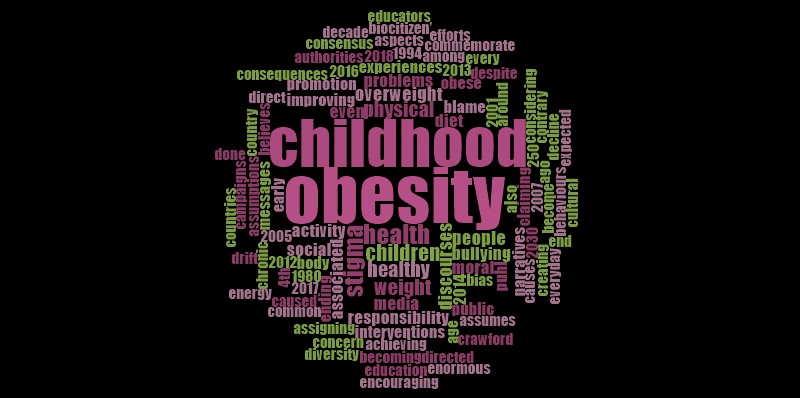Obesity: Ending children’s stigma

Author: Cecilia Prieto, PhD researcher in Population Health Sciences
Every 4th of March we commemorate the international World Obesity Day. The prevalence of being overweight and obesity in children has become a serious public health problem in countries worldwide (World Health Organisation [WHO], 2018).
Even though obesity has many causes (e.g., individual, environmental, among others), most interventions focus on health promotion, particularly physical activity and healthy diet, as if obesity were caused because of an ‘energy imbalance’. Thus, the common policy response to healthy weight revolves around ´lifestyle drift’ (Whitehead, 2012), where populations’ social problems are reduced to individuals’ problems. As a result, it is not surprising that the experts keep claiming that the solution against obesity is maintaining a healthy diet and physical activity.
Despite the enormous resources directed at health promotion campaigns, there has been no decline in childhood overweight/obesity rates. There is no country-level programme which is reversing obesity rates by focusing on physical activity and healthy diet (Swinburn, 2014).
Since childhood, people are exposed to ‘pro-thin’ bias messages, which are reinforced through age. There is a ‘Healthism’ narrative (Crawford, 1980) creating a positive moralisation of health. This promotes an extreme monitoring of the body, healthy behaviours and becoming a ‘Biocitizen’ (Turner, 1994), who takes over their own health management and assumes that responsibility for themselves and society.
In contrast, obesity discourses are associated with the moral inferiority of being obese (Gard and Wright, 2005). These discourses reflect stereotypes that people who are overweight are unhealthy, lazy, and unconcerned about their health. In the media, obesity discourses are associated with individual, moral responsibility (Farrell, Warin, Moore, and Street, 2016). This is a concern because children learn about weight through media messages, fat-talk at homes, or school interventions (Graf and Schweiger, 2017). Therefore, these moral narratives widely found in our everyday lives lead to stigmatising people who are overweight/obese and their families.
From early childhood, the experience of stigma can be felt directly, such as children experiencing verbal teasing, physical bullying, relational victimisation and other types of bullying (Puhl and Latner, 2007). Children can be ridiculed by their peers because of their weight and assumptions associated with it. Such physiological, social and psychological experiences can be extremely harmful. Amongst the known consequences are children experiencing chronic stress, more weight gain, or poor health outcomes in the future (Tomiyama, 2014).
The need to end the stigma of obesity is increasingly recognised. More efforts are required to address this in childhood. This must involve: improving education to medical students and public health professionals, to include social and cultural insights; creating new narratives and inclusive language about obesity; and ensuring interventions consider children first and their weight second.
References
Crawford, R. (1980). Healthism and the Medicalization of Everyday Life. International Journal of Health Services, 10(3), 365-388. https://doi:10.2190/3H2H-3XJN-3KAY-G9NY
Farrell, L. C., Warin, M. J., Moore, V. M., and Street, J. M. (2016). Emotion in obesity discourse: understanding public attitudes towards regulations for obesity prevention. Sociology of Health and Illness, 38(4), 543-558. https://doi:10.1111/1467-9566.12378
Gard, M., and Wright, J. (2005). The obesity epidemic: science, morality and ideology. Routledge.
Graf, G., and Schweiger, G. (2017). Chapter 3 Body and Eating. In G. Graf & G. Schweiger (Eds.), Ethics and the Endangerment of Children’s Bodies (1st edition. pp. 77-141) Springer International Publishing
Puhl, R. M., and Latner, J. D. (2007). Stigma, Obesity, and the Health of the Nation’s Children. Psychological Bulletin, 133(4), 557-580. https://doi:10.1037/0033-2909.133.4.557
Swinburn, B. A. (2014). Chapter 4 Why Are Governments Abdicating from Dealing with the Obesity Crisis? In D. W. Haslam, A. M. Sharma, and C. W. Le Roux (Eds.), Controversies in obesity (pp. 23-29). Springer.
Tomiyama, A. J. (2014). Weight stigma is stressful. A review of evidence for the Cyclic Obesity/Weight-Based Stigma model. Appetite, 82(C), 8-15. https:// doi:10.1016/j.appet.2014.06.108
Turner, B. S. (1994). General Commentary In B. S. Turner and P. Hamilton (Eds.), Citizenship: critical concepts (Vol. 1). Routledge.
Whitehead, M. (2012). Waving or drowning? A view of health equity from Europe. Australian and New Zealand Journal of Public Health, 36(6), 523-523. https:// doi:10.1111/j.1753-6405.2012.00947.x
WHO. (2018). Taking Action on Childhood Obesity. https://apps.who.int/iris/bitstream/handle/10665/274792/WHO-NMH-PND-ECHO-18.1-eng.pdf?ua=1
Contact the author
Email: Cecilia.Prieto@ed.ac.uk




Comments are closed
Comments to this thread have been closed by the post author or by an administrator.